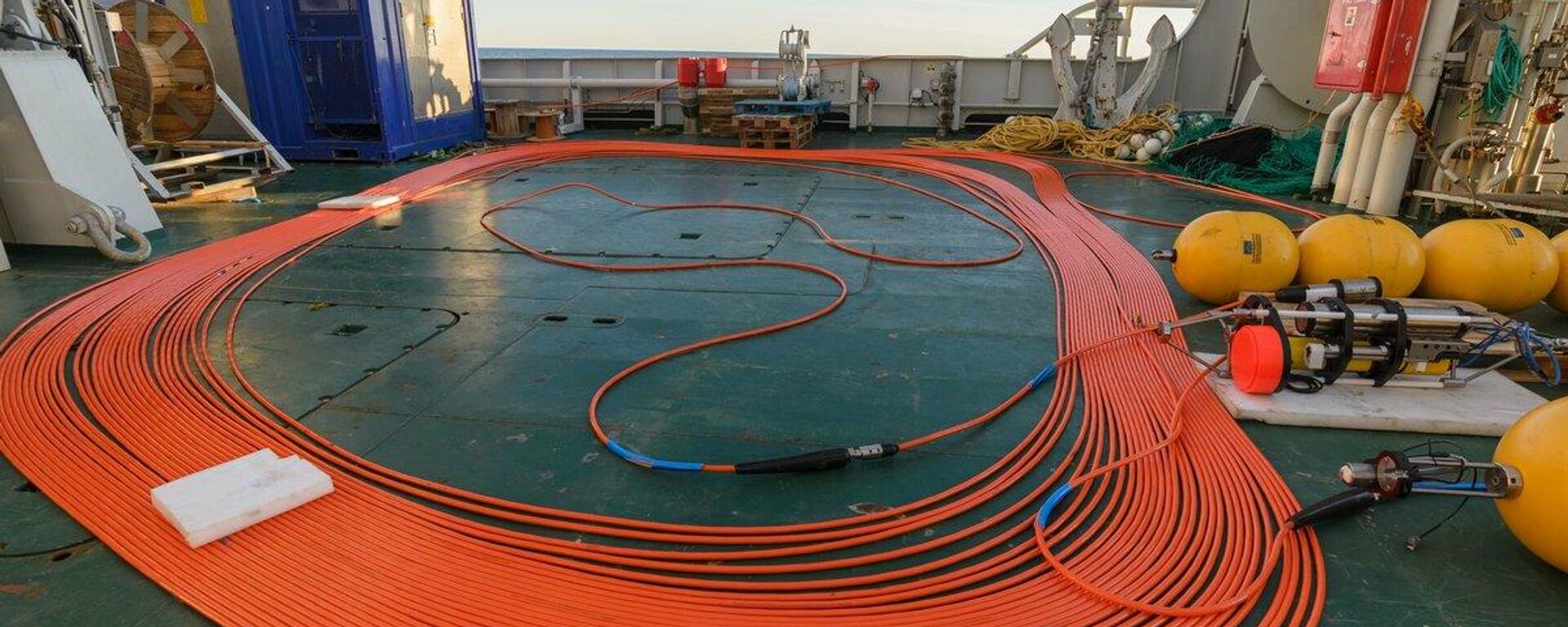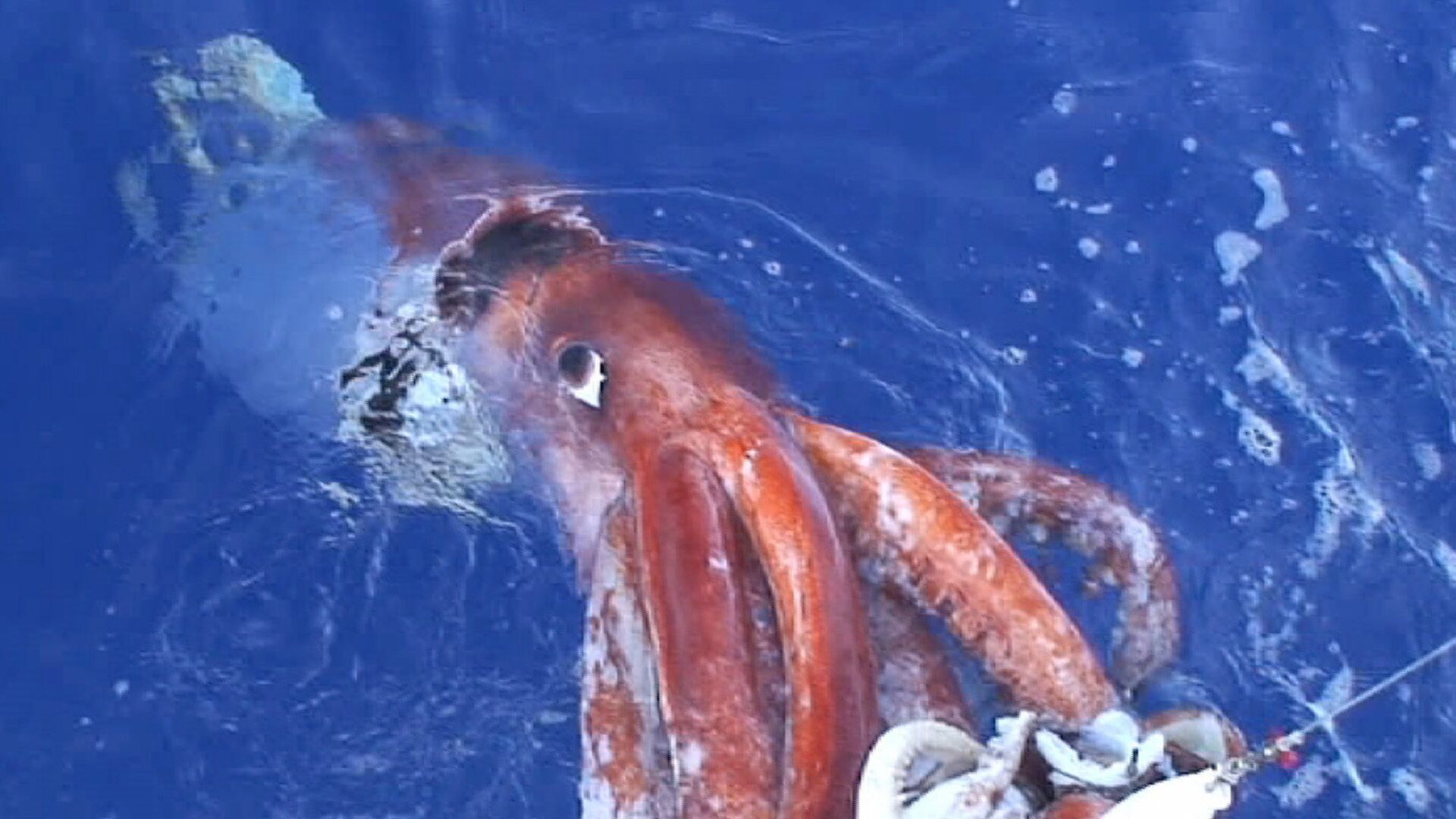https://sputnikglobe.com/20211111/mystery-of-lost-norwegian-underwater-cable-sea-monsters-giant-squid-and-russian-submarines-1090647458.html
Mystery of Lost Norwegian Underwater Cable: Sea Monsters, Giant Squid, and Russian Submarines
Mystery of Lost Norwegian Underwater Cable: Sea Monsters, Giant Squid, and Russian Submarines
Sputnik International
A total of ten tonnes of cable from the nation's giant offshore network, located some 200 metres underwater and about 30 kilometres from land, has disappeared... 11.11.2021, Sputnik International
2021-11-11T07:29+0000
2021-11-11T07:29+0000
2021-11-11T07:29+0000
newsfeed
russia
norway
underwater
scandinavia
https://cdn1.img.sputnikglobe.com/img/105571/80/1055718027_0:0:2615:1472_1920x0_80_0_0_379010e2b9ac846e6b707155697fc67c.jpg
The mysterious disappearance of a four-kilometre-long cable on the seabed outside the Vesterålen archipelago in northern Norway has left specialists and pundits scratching their heads and suggesting versions one wilder than the other.According to the Norwegian Institute of Marine Research, a total of ten tonnes of cable from the country's giant offshore network, located some 200 metres underwater and about 30 kilometres from land, was lost.National broadcaster NRK has compiled five versions of various probability.First, a trawler could have dragged the cable from its resting place. The area has been described as frequented by trawlers, which can easily haul up to 30 tonnes of catch. However, despite trawlers having the power to do so, a ten-tonne submarine cable wouldn't go unnoticed.Next off is that the cable was removed by sea currents. Yet, according to Institute of Marine Research oceanographer and specialist on ocean currents Jon Albretsen, local currents are not strong enough to rip off a cable. He called this perspective "completely unbelievable".Third, a large animal such as a whale could have disrupted the cable. In particular, humpback whales, playful and curious, are known to gather in the area while hunting for herring.Marine mammal researcher Tore Haug, however, underscored that while humpback whales grow to be about 15 metres long, they lack the power to drag such a cable and would have likely been stuck.Fourth among the possible culprits were "sea monsters", such as a giant octopus or giant squid.Giant squid can grow up 20 metres long and they have a beak-like mouth with sharp teeth. While acknowledging the possibility to do "great harm", Axelsen said he failed to see the "motivation behind it".Last, but not least, the broadcaster directed its suspicions at Russia.According to Ulriksen, Russia currently has about 20 submarines around Norwegian waters. In addition, Norway's northern waters are visited by American, British, French, and Norwegian submarines. While ordinary submarines cannot move large cables, there are special ones that can, he stressed.Perhaps tellingly, in an attached poll, a vast majority of Norwegian readers supported the Russian version (68 percent at the time of writing), with the trawler and the giant squid versions trailing second and third at merely 19 and 11 percent respectively.This reflects the years of the Norwegian media, politicians, and military officials portraying Russia in a negative light, often citing perceived wrongdoings and fictitious threats and using it as a scapegoat in Cold War-style rhetoric. Arguably the most egregious example of this phenomenon is the fictional political thriller "Occupied", where Norway suffers an outright Russian invasion. It has been slammed as anti-historical, as the two nations have never been at war with each other (unlike, say, Russia and Sweden that waged numerous wars). Furthermore, it was the Red Army that liberated northern Norway from Nazi occupation during the final stage of World War II.
https://sputnikglobe.com/20211109/norwegian-authorities-suspicious-after-4-km-long-length-of-surveillance-cable-gets-cut-disappears-1090602852.html
norway
scandinavia
Sputnik International
feedback@sputniknews.com
+74956456601
MIA „Rosiya Segodnya“
2021
News
en_EN
Sputnik International
feedback@sputniknews.com
+74956456601
MIA „Rosiya Segodnya“
Sputnik International
feedback@sputniknews.com
+74956456601
MIA „Rosiya Segodnya“
newsfeed, norway, underwater, scandinavia
newsfeed, norway, underwater, scandinavia
Mystery of Lost Norwegian Underwater Cable: Sea Monsters, Giant Squid, and Russian Submarines
A total of ten tonnes of cable from the nation's giant offshore network, located some 200 metres underwater and about 30 kilometres from land, has disappeared without a trace, the Norwegian Institute of Marine Research reported on 5 November.
The mysterious disappearance of a four-kilometre-long cable on the seabed outside the Vesterålen archipelago in northern Norway has left specialists and pundits scratching their heads and suggesting versions one wilder than the other.
According to the Norwegian Institute of Marine Research, a total of ten tonnes of cable from the country's giant offshore network, located some 200 metres underwater and about 30 kilometres from land, was lost.
National broadcaster
NRK has
compiled five versions of various probability.

9 November 2021, 19:02 GMT
First, a trawler could have dragged the cable from its resting place. The area has been described as frequented by trawlers, which can easily haul up to 30 tonnes of catch. However, despite trawlers having the power to do so, a ten-tonne submarine cable wouldn't go unnoticed.
Next off is that the cable was removed by sea currents. Yet, according to Institute of Marine Research oceanographer and specialist on ocean currents Jon Albretsen, local currents are not strong enough to rip off a cable. He called this perspective "completely unbelievable".
Third, a large animal such as a whale could have disrupted the cable. In particular, humpback whales, playful and curious, are known to gather in the area while hunting for herring.
Marine mammal researcher Tore Haug, however, underscored that while humpback whales grow to be about 15 metres long, they lack the power to drag such a cable and would have likely been stuck.
Fourth among the possible culprits were "sea monsters", such as a giant octopus or giant squid.
"There are many large creatures down in the great depths. There are, among other things, giant squid, which often do battle with sperm whales", Bjørn Erik Axelsen, head of research on deep water animals at the Institute of Marine Research, told NRK. According to Axelsen, in recent times there have been 20 sightings of giant squid along the Norwegian coast.
Giant squid can grow up 20 metres long and they have a beak-like mouth with sharp teeth. While acknowledging the possibility to do "great harm", Axelsen said he failed to see the "motivation behind it".
Last, but not least, the broadcaster directed its suspicions at Russia.
"Ten tonnes of cable doesn't disappear by itself. It is the security policy in the north that it is really about. Therefore, it is clear that there is a motive for putting a cable out of play with advanced equipment", Naval Academy lecturer Ståle Ulriksen suggested. "There is enough security-political-military tension in the area so that's a possible explanation", he mused, citing the superpower struggle in the Arctic waters.
According to Ulriksen, Russia currently has about 20 submarines around Norwegian waters. In addition, Norway's northern waters are visited by American, British, French, and Norwegian submarines. While ordinary submarines cannot move large cables, there are special ones that can, he stressed.
Perhaps tellingly, in an attached poll, a vast majority of Norwegian readers supported the Russian version (68 percent at the time of writing), with the trawler and the giant squid versions trailing second and third at merely 19 and 11 percent respectively.
This reflects the years of the Norwegian media, politicians, and military officials portraying Russia in a negative light, often citing perceived wrongdoings and fictitious threats and using it as a scapegoat in Cold War-style rhetoric. Arguably the most egregious example of this phenomenon is the fictional political thriller "Occupied", where Norway suffers an outright Russian invasion. It has been slammed as anti-historical, as the two nations have never been at war with each other (unlike, say, Russia and Sweden that waged numerous wars). Furthermore, it was the Red Army that liberated northern Norway from Nazi occupation during the final stage of World War II.





